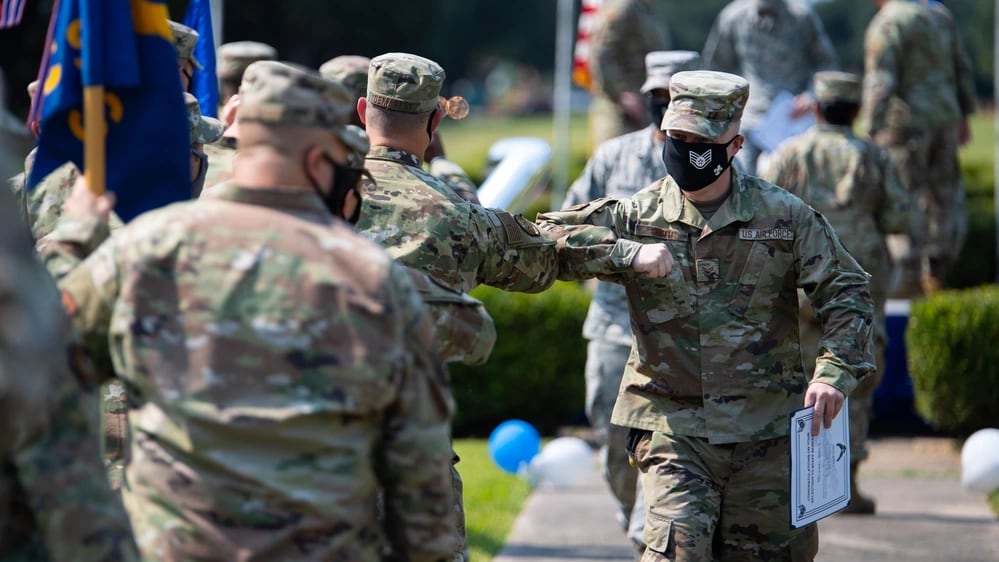Senior enlisted leaders across the services hope to secure pay raises for midlevel enlisted troops and to improve benefits like the housing allowance as part of a sweeping study of how the U.S. compensates its service members.
That effort comes amid complaints from some enlisted airmen that the Air Force’s plan to slow the rate of midlevel promotions will end up hurting their wallets in a tumultuous economy.
The Pentagon is due for its 14th Quadrennial Review of Military Compensation, an analysis commissioned by the federal government every four years to assess whether troops receive fair pay and benefits.
In an interview with Air Force Times on Tuesday, Chief Master Sergeant of the Air Force JoAnne Bass said she and her fellow senior enlisted leaders in the Army, Navy, Marine Corps and Space Force recently helped Pentagon officials pull together a list of priorities for the president, whose responsibility it is to launch the review.
“What we’re asking for is a holistic look at our military compensation, to include health care, for our service members and their families,” she said. “We’re looking at … a targeted pay raise, specifically to our [noncommissioned officer] corps.”
The military also needs a better way to calculate how much money it provides to troops to keep pace with the cost of living, housing and subsistence stipends, and similar incentives, she said. Organizations like the Military Officers Association of America have echoed that message as well.
“To be a year or two … late to need is not helpful to anybody,” Bass said.
RELATED

Airmen receive housing allowances based on their rank, their number of dependents and where they are stationed. Amounts are based on the previous year’s average cost of rent in a particular area. But inflation and housing demand have complicated matters for families across the country.
For example, rent prices for single-family homes reached a national average of $2,495 a month in the first half of 2022, more than 13% above the same period in 2021, the real estate brokerage HouseCanary reported in August. Housing costs have spiked even more in some parts of the country.
That puts pressure on people whose household budgets ultimately depend on the Pentagon’s calculus and congressional approval.
Still, military personnel advocates don’t anticipate the review will offer short-term relief.
“As with previous reviews, it’s unlikely the 14th QMRC will be completed within the four-year requirement,” MOAA wrote Aug. 24. “We can anticipate a letter to be issued later this year, as noted by Undersecretary of Defense for Personnel and Readiness Gilbert Cisneros. Given an average of three years to complete, the next report likely would be submitted in the fall of 2025 — nearly five years after the previous report.”
RELATED

Bass speculated that the military compensation review could look to artificial intelligence to help predict how families should be paid in potentially volatile financial times.
“The current way of doing a study every two years is not what we should be doing in today’s 21st century,” Bass said. “Our service members and their families deserve better.”
She pushed back on worries that shrinking opportunities for airmen to climb the ladder to midlevel enlisted jobs — and therefore, higher pay grades — will hurt their ability to make ends meet.
“The challenges that we have with inflation are very real to every single person, whether you’re in the military or not,” Bass said. “But that’s very separate from our promotion rates.”
The Air Force believes enlisted airmen will spend about six to 12 months in grade before promoting to staff sergeant, and an extra year, on average, as staff sergeants and technical sergeants.
RELATED

“Compensation is key in recruiting an all-volunteer force and retaining top talent,” service spokesperson Tech. Sgt. Deana Heitzman said. “Continued engagement among supervisors and their airmen ensures we have all the tools necessary to take care of the needs of our airmen and their families.”
Some enlisted airmen will also see pay cuts of up to $5,400 a year due to a shrinking budget for those in “special duty” jobs deemed particularly important or dangerous.
Asked what message she would send to enlisted airmen who feel like the Air Force’s financial punching bag, Bass said: “Control what you can control. Do your job, do it well.”
“Trust that your leadership chains are sharing the message that they need to — upward,” she said. “Trust that myself and [Air Force Chief of Staff Gen. ‘CQ’ Brown] are working really hard to ensure that we are beating the drum when it comes to the pay, the benefits, the quality of life and quality of service of our airmen.”
Rachel Cohen is the editor of Air Force Times. She joined the publication as its senior reporter in March 2021. Her work has appeared in the Washington Post, the Frederick News-Post (Md.), Air and Space Forces Magazine, Inside Defense, Inside Health Policy and elsewhere.





